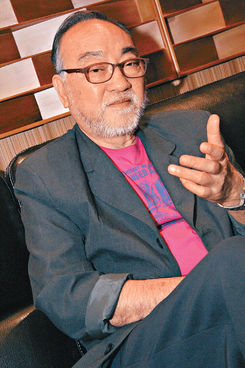Yip Ching (Angelica Lee) meets with Poon Tsz Wan (Eunice Ho), the reporter who had inquired about Wai Man Hin's dealings in episode 3. She wants Poon to help her investigate the truth about Wai's death. Poon agrees and also warns Yip Ching to be careful of the people around her, as she had found out that the mysterious "Sam" was Cheung Kwai Lung (Gregory Wong).

Lee Tsz Kwan (Mimi Kung) arrives at the police station to serve as counsel for her husband Song Man San (Liu Kai-chi), who is giving his account of what happened before Luk Wai To's death. He says that Luk was suffering under the immense pressure of the election campaign. He uses his wife to assert his story that Luk had begged him to find a reason for him to quit the race. Lee appears taken aback for a moment, but goes along with it. Song also claims that when he had arrived at the rooftop, Luk had already fallen to his death.
Yip Ching concludes a meeting with a legislator, who expresses admiration for her platform and agrees to give her his nomination ballot. He invites her to meet with his politician friends in the next room. They turn out to be the youth faction of the DALP, led by Fong Kai Chiu (Alan Luk). They want her to run against Ho Chun Pak (Samuel Kwok) in the DALP's internal elections, but she declines.
Between 1999-2011, a faction of young members in the Democratic Party of Hong Kong, nicknamed the "Young Turks", attempted to challenge the mainstream party ideology and adopt more grassroots ideas. It created a split within the party and many Young Turks eventually quit the party to join other political organizations. The Neo Democrats is one of the prominent new organizations founded by Young Turks.
Song holds a press conference to read a text message that Luk had supposedly sent out before his death. In the message, Luk apologizes for not being able to complete the election run and requests privacy for his family. Song does not disclose the last past of the message, saying that it is related to himself. Meanwhile, Yip Ching's team organize themselves to take advantage of the temporary void left by Luk's death.

Yip Ching tricks Cheung into believing that she will negotiate with Fong to join the DALP. When he arrives at the place where they were supposed to meet, he finds only Yip Ching there. She exposes all his lies, including his connections to Song and the reporter Gei Man Wai (Isabel Chan). Cheung tries to explain that he is only using Song to help her, but she refuses to believe him anymore.
Song sends the full text of Luk's last message to Gei, which he wants published as tomorrow's headlines. Gei has to storm into the office of the HKMG president, Sum Suet Lai (Violet Li), to get this accomplished.
Members of the DNRA have a meeting to discuss Song's candidacy. Song asks for half an hour to consider it and returns to his office to wait for a call from Mr. Wong. His assistant suggests that they can act without Mr. Wong's blessings, but Song angrily expresses that if Mr. Wong does not support him, he will do everything in his power to ensure that the party loses badly in the election. Finally, the phone rings.
Back in the meeting room, Song proudly declares his intention to run in the 2022 Chief Executive election. He promptly holds a press conference to announce it to the public. Afterwards, he and his assistant consider people for their campaign team. Song states that he wants Cheung as his campaign manager.

Meanwhile, Cheung is in a drunken stupor at a club, where he is seduced by a woman. Just as they are about to have sex in the alley, they are caught by police officers. At the station, the woman accuses him of trying to rape her. Lee arrives to post bail for him. She brings him to see Song, who says that he can make the case go away, as long as Cheung agrees to be his campaign manager. When Cheung rejects the offer, Song informs him that the woman he tried to have sex with is the wife of a deputy minister.
The next day, the media surround Yip Ching's office looking for a comment about Cheung's case. Over the phone, Cheung instructs the team to make a press release distancing themselves from him. He also wants Yip Ching to report him to the ICAC for taking bribes from Song, so that they can take Song down before he has a chance to strike. However, Yip Ching has other ideas.
She goes to see the deputy minister whose wife is involved in the case. She reveals her knowledge of a case from two years ago where the wife was caught up in a separate scandal, but the deputy minister had used his powers to cover it up. Yip Ching says that if Cheung is falsely accused of rape, she will withdraw from the election and spend her time exposing this to the public.
Cheung is hounded by the media outside his home. He dissociates himself from Yip Ching's campaign, but she shows up and declares her support for him. Song and his wife watch the scene on the news broadcast. He remarks with amusement that this will be a spectacular election campaign.
Election countdown: 102 days










